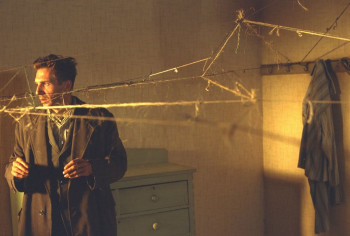I’m Going to Kill Myself Tomorrow
Elliott Smith’s “Needle in the Hay” isn’t about suicide, but it’s certainly a fitting backdrop for one.
Elliott Smith’s “Needle in the Hay” isn’t about suicide, but it’s certainly a fitting backdrop for one.
As filmmaking goes, Nick Broomfield’s Monster in a Box doesn’t have much to offer. It’s basically Spalding Gray sitting at a desk talking, with some lighting effects and unobtrusive but effective mood music by Laurie Anderson. So, naturally, it’s one of my favorite movies.
There is the sneaking suspicion reading The New York Trilogy, Paul Auster’s collection of short novels, that the works are related. The hunch is not only that the stories are related thematically or in their ultimate message or outcomes – they most certainly are – but that they represent a single, cohesive work rather than three repetitive novellas.
I love Jeff Bridges. I love Tim Robbins. I love them equally, and (my gut tells me) in about the same way. We are a ménage à trios, even if they don’t know it yet.
Magnolia breaks through the self-aware emotional vacancy of the decade’s cool movies (both sterile and knowingly clever, epitomized by Quentin Tarantino) without losing its edge; it gets inside its characters’ minds and hearts with dazzling style. It is afraid of neither elaborate tracking shots nor a good, fairly won cry.
Spike Lee’s 25th Hour would appear to be about a good-hearted drug dealer’s last day of freedom before he begins a seven-year prison sentence, but the movie insistently pushes itself beyond that. It should be a circumscribed drama limited to the dealer (named Monty and played by Edward Norton), his girlfriend, his father, and his two best friends, but the film regularly veers into the margins.
 After watching David Cronenberg’s Spider, I was acutely underwhelmed and disappointed. It could be that the movie’s impact on my first viewing – akin to dropping a light object onto a feather pillow – was a function of overblown expectations. Or it could be that the movie was designed to end with more of a whimper than a bang.
After watching David Cronenberg’s Spider, I was acutely underwhelmed and disappointed. It could be that the movie’s impact on my first viewing – akin to dropping a light object onto a feather pillow – was a function of overblown expectations. Or it could be that the movie was designed to end with more of a whimper than a bang.
If you think the subject of Atom Egoyan’s Ararat is the genocide in 1915 of 1.5 million Armenians by Turks (as most critics seem to believe), you’ll find the movie a confused mess. But reducing the film to that summary is akin to saying the director’s The Sweet Hereafter was about a bus accident, or that his Exotica was about strippers.